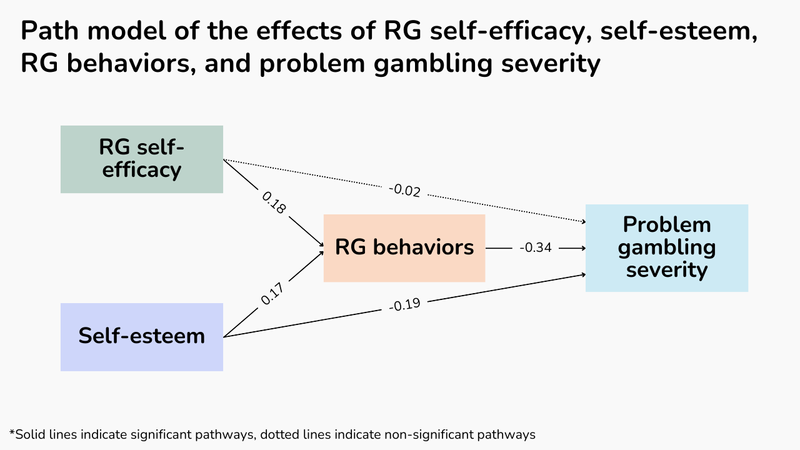The WAGER, Vol. 29(7) – Responsible gambling behaviors and the role of self-efficacy and self-esteem
Gamblers can engage in protective behaviors—like setting time or money limits—to reduce risk and prevent harms that can occur when gambling. Certain psychological factors might influence gamblers’ use of these responsible gambling (RG) behaviors. For example, self-esteem (i.e., one’s sense of personal value or worth) and self-efficacy (i.e., belief in one’s capacity to complete behaviors or reach a goal) are associated with the use of various protective health behaviors, but little is known about how these factors might relate to RG behaviors. This week, The WAGER reviews a study by Mu He and Kwok Kit Tong that examined the association between self-esteem and RG self-efficacy and RG behaviors.
What was the research question?
How are self-esteem and RG self-efficacy associated with RG behaviors?
What did the researchers do?
Two hundred and thirty-six past-year gamblers were recruited in Macau, China. They completed questionnaires assessing their general self-esteem and their self-efficacy to perform RG behaviors in various situations. Participants rated how frequently they engaged in RG behaviors. They also reported on their past-year problem gambling severity, endorsing between 0-9 criteria for Gambling Disorder from the DSM-5. The researchers conducted a path analysis to examine how self-esteem and RG self-efficacy were associated with RG behaviors and problem gambling severity.
What did they find?
Self-esteem and RG self-efficacy were both positively associated with RG behaviors, and self-esteem was negatively associated with problem gambling severity (see Figure). RG behaviors were also negatively associated with problem gambling severity. The relationship between RG self-efficacy and problem gambling severity was fully mediated by RG behaviors, and the relationship between self-esteem and problem gambling severity was partially mediated by RG behaviors.

Figure. Path model of the effects of RG self-efficacy, self-esteem, RG behaviors, and problem gambling severity. Solid lines indicate statistically significant pathways and dotted lines indicate non-significant pathways. Adapted from He, M., & Tong, K. K. (2024). Click image to enlarge.
Why do these findings matter?
This study found that gamblers with higher self-esteem and RG self-efficacy engaged in more RG behaviors, which were associated with lower problem gambling severity. Previous research has found that psychological factors like self-efficacy may be important in the treatment of gambling problems, and can help support abstinence from gambling. The current study’s findings extend the importance of self-esteem and self-efficacy to RG. These findings are relevant for all gamblers, including those at risk for or experiencing gambling problems who do not want to abstain from gambling. Interventions that improve general self-esteem and target RG self-efficacy might be beneficial for increasing use of safer gambling behaviors among a broad spectrum of gamblers, and might help to optimize the effectiveness of RG as a primary prevention strategy.
Every study has limitations. What are the limitations of this study?
This study used a cross-sectional design, so causality between variables cannot be determined. In other words, we cannot determine whether RG self-efficacy and self-esteem actually affected the use of RG behaviors. Findings from this study may not be generalizable to other geographic regions beyond Macau, where the gambling landscape and gambling norms are different.
For more information:
Do you think you or someone you know has a gambling problem? Visit the National Council on Problem Gambling for screening tools and resources. For additional resources, including gambling and self-help tools, visit our Addiction Resources page.
— Kira Landauer, MPH